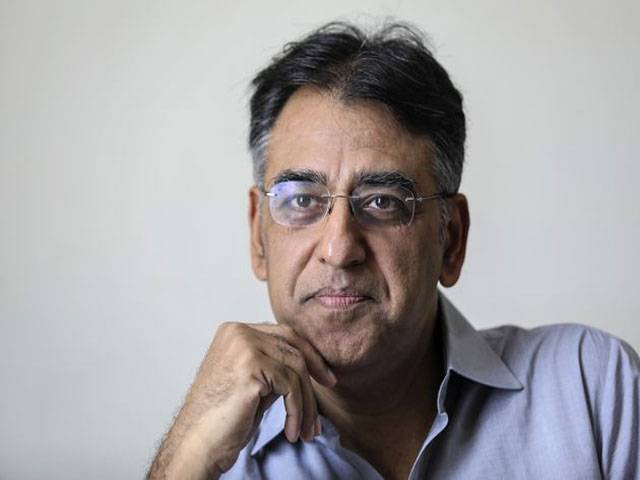ISLAMABAD - Pakistan Tehreek-e-Insaf’s central leader Asad Umar said Tuesday that PTI-led government will decide next month (September) whether to approach International Monetary Fund (IMF) or friendly countries such as China to avert a balance of payment crisis.
Talking to media here, Asad Umar, who is expected to become finance minister in the PTI government, said so far he was not in a position to predict about financing gap of the country due to no access to the official data. However, he said, it seemed crucial decisions will have to be made to avert the balance of payment crisis. “We will decide by the end of next month which way we will have to go,” Umar said and added that the government would consider several options including approaching IMF, commercial borrowings, taking bilateral loans, tapping global market or for looking overseas Pakistanis.
Talking about out-of-box solution, he informed that PTI-led government would launch investment bonds for overseas Pakistanis, as they have high trust in Imran Khan, the incoming prime minister of the country. The bond would be alike as the Central Directorate of National Savings (CDNS) launching a dollar-denominated bond for attracting investment from millions of overseas Pakistanis. Similarly, for the long run, the PTI government would bring improvement in the land and property sectors, he said.
Umar said that PTI would not give any ‘lollypop’ to the masses as immediate relief. The new government would go for reforms in the first 100 days, which is essential for the economy. “We will give clear direction in first 100 days where we are heading.”
He vowed to reduce the indirect taxes and increase direct taxes to give relief to the masses. Similarly, the PTI-led government would also bring reforms in the Federal Board of Revenue (FBR) to improve the revenue collection. It would also separate the tax policy from the tax administration and would stop large scale tax evasion and corruption, he added. He said PTI government would provide jobs as per its election manifesto in different sectors of the economy.
The economic wizard of the PTI said that they would establish a ‘wealth fund’ to run the public sector entities (PSEs) including Pakistan International Airlines (PIA), Pakistan Steel Mills (PSM) and others. These PSEs would be run by appointing and empowering non-political and autonomous boards instead of concerned ministries. He was of the view that there would be no need of legislation for this process. The idea of a wealth fund is modelled on the concept of Khazanah in Malaysia, which is a sovereign wealth fund of the government. It holds and manages selected commercial assets of the government and undertakes strategic investments on behalf of the nation. The new government would have to create fiscal space to clear the debt of PIA and PSM.
The hopeful finance minister vowed to bring all agreements signed by the previous governments with foreign countries, including the deal for import of liquefied natural gas and China-Pakistan Economic Corridor (CPEC) projects would be presented before the parliament. There will be complete transparency in every matter, he added.
He assured that the PTI government would remove recklessness in fiscal and monetary policies. The budget deficit had shot to 7 percent of the GDP in last fiscal year as against the target of 4.1 percent of the GDP. Similarly, the current account deficit is two billion dollars every month. In 2013, the current account deficit was two billion dollars in a year. Tough decisions would be made to stabilise the economy, he added. Umar said that PTI government would not give any development package to the parliamentarians Pakistan to decide whether to seek IMF bailout ‘by September’
AFP adds: Umar spoke a week after the US raised fears that Pakistan could use any bailout from the International Monetary Fund to pay off debts to China.
Pakistan has gone to the IMF repeatedly since the late 1980s. The last time was in 2013, when Islamabad got a $6.6 billion loan to tackle a similar crisis.
Analysts have said this time that the new government will have to act quickly as the country teeters on the verge of a new balance-of-payments crisis which could threaten its currency and its ability to repay debts or pay for imports. Its budget deficit has grown steadily over the past five years, from four percent to 10 percent of GDP.
As a result, its foreign currency reserves have declined to about $10.3 billion, covering less than two months of imports. The rupee has been devalued four times since December, fuelling inflation. Umar said his party has not yet been given access to the official data.
But he was quick to add that while the situation is “dire”, it is not the first time Pakistan has faced such challenges.
“We came out of it earlier, we will come out of it again,” he said.
Analysts say Pakistan needs a loan of around $12 billion to turn the corner, but a diplomat has told AFP Islamabad is betting on a loan of at least $6.5 billion from the IMF to get it through the crisis. However there are fears the terms of any new loan will be more stringent than in 2013, due to tense relations with the US, the lender’s biggest donor.
In July, US Secretary of State Mike Pompeo voiced concerns over any IMF bailout being used to repay Chinese loans to Islamabad.
The state of national finances could also undermine one of Khan’s most popular promises, his “Islamic welfare state”, based on increased spending on education and health.
“Obviously, the scale of these interventions... will be more limited initially with the resource constraints, but it will grow in size. You will not have to wait five years to see things that are new and different,” Umar said.
“In last fiscal year, Rs65 billion was given to parliamentarians, which was illegal and political bribery”.






